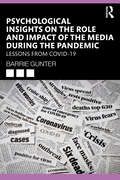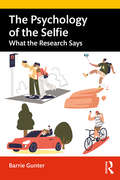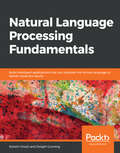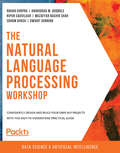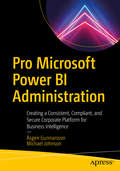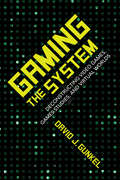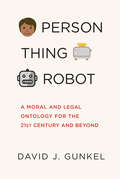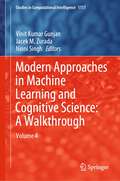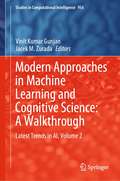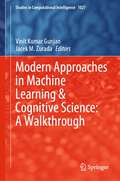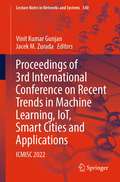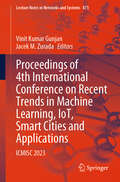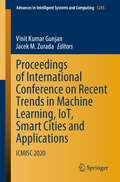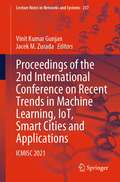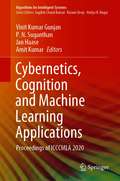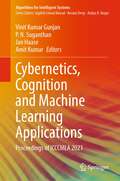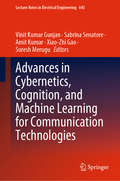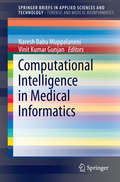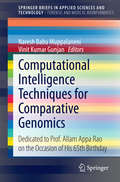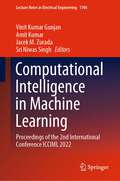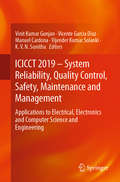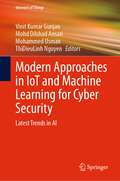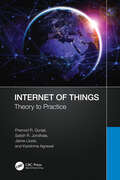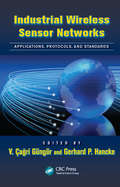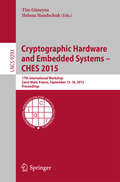- Table View
- List View
Psychological Insights on the Role and Impact of the Media During the Pandemic: Lessons from COVID-19
by Barrie GunterThis volume places the spotlight on the role different media and communications systems played in informing the public about the pandemic, shaping their views about what was happening and contributing to behavioural compliances with pandemic-related restrictions. Throughout the pandemic, media coverage has played an important role in drawing attention to specific messages, influencing public risk perceptions and fear responses. Mainstream media and other electronic communication systems such as Facebook and WhatsApp have been pivotal in getting pandemic information out to the public, thereby influencing their beliefs, attitudes and behaviour and engaging them generally in the pandemic as stakeholders. In this timely volume, author Barrie Gunter considers how people reacted to this coverage and its contribution to their understanding of what was going on, including the influence of fake news and misinformation on public beliefs about the pandemic, from anti-lockdown protests to the "anti-vaxx" movement. In addition, looking at how government messaging was not always consistent or clear and how different authorities were found not always to be in harmony or compliance with the messages they put out, Gunter examines the harm done by presenting different publics with ambiguous or conflicting narratives. Drawing out important communications strategy lessons to be learned for the future, this is essential reading for students and researchers in psychology, public health and medical sciences and for policymakers who assess government strategies, responses and performance.
The Psychology of the Selfie: What the Research Says
by Barrie GunterThe Psychology of the Selfie provides a comprehensive overview and analysis of research on the significance of selfies, offering insights into the topic from a psychological perspective and examining important issues such as body image, self-objectification, mental health and psychological benefits. Selfies are a worldwide phenomenon. Although dismissed by critics as a sign of self-absorbed narcissism, they are also a social currency that maintains and reinforces friendships, a feedback loop for self-identity affirmation, a promotional tool for gaining social influence, and a method for preserving memories of life events. In this book, Barrie Gunter expertly explores the psychological underpinnings of the contemporary global phenomenon of "selfies", from the historical roots and meteoric rise due to technical advancements, to the different personality types of selfie-takers, to social relationships, to group and personal identity. Looking at both the psychological nature and impact of selfies, this book reviews different psychological outcomes for selfie-takers, both positive and negative, and the growth in psychological and physical problems that can sometimes arise. Presenting a comprehensive analysis specifically of selfie behaviour, this book is an essential reference for students and researchers in communications and media, journalism, information studies, psychology and sociology, as well as anyone with a general interest in the phenomenon.
Natural Language Processing Fundamentals: Build intelligent applications that can interpret the human language to deliver impactful results
by Dwight Gunning Sy Hwang Dongjun JungNatural Language Processing Fundamentals is designed for novice and mid-level data scientists and machine learning developers, who want to gather and analyze text data to build an NLP-powered product. It'll help you to have prior experience of coding in Python - using data types, writing functions, and importing libraries. Some experience with linguistics and probability is useful but is not necessary.
The Natural Language Processing Workshop: Confidently design and build your own NLP projects with this easy-to-understand practical guide
by Dwight Gunning Rohan Chopra Sohom Ghosh Nipun Sadvilkar Aniruddha M. Godbole Muzaffar Bashir ShahMake NLP easy by building chatbots and models, and executing various NLP tasks to gain data-driven insights from raw text dataKey FeaturesGet familiar with key natural language processing (NLP) concepts and terminologyExplore the functionalities and features of popular NLP toolsLearn how to use Python programming and third-party libraries to perform NLP tasksBook DescriptionDo you want to learn how to communicate with computer systems using Natural Language Processing (NLP) techniques, or make a machine understand human sentiments? Do you want to build applications like Siri, Alexa, or chatbots, even if you've never done it before?With The Natural Language Processing Workshop, you can expect to make consistent progress as a beginner, and get up to speed in an interactive way, with the help of hands-on activities and fun exercises.The book starts with an introduction to NLP. You'll study different approaches to NLP tasks, and perform exercises in Python to understand the process of preparing datasets for NLP models. Next, you'll use advanced NLP algorithms and visualization techniques to collect datasets from open websites, and to summarize and generate random text from a document. In the final chapters, you'll use NLP to create a chatbot that detects positive or negative sentiment in text documents such as movie reviews.By the end of this book, you'll be equipped with the essential NLP tools and techniques you need to solve common business problems that involve processing text.What you will learnObtain, verify, clean and transform text data into a correct format for useUse methods such as tokenization and stemming for text extractionDevelop a classifier to classify comments in Wikipedia articlesCollect data from open websites with the help of web scrapingTrain a model to detect topics in a set of documents using topic modelingDiscover techniques to represent text as word and document vectorsWho this book is forThis book is for beginner to mid-level data scientists, machine learning developers, and NLP enthusiasts. A basic understanding of machine learning and NLP is required to help you grasp the topics in this workshop more quickly.
Pro Microsoft Power BI Administration: Creating a Consistent, Compliant, and Secure Corporate Platform for Business Intelligence
by Ásgeir Gunnarsson Michael JohnsonManage Power BI within organizations. This book helps you systematize administration as Microsoft shifts Power BI from a self-service tool to an enterprise tool. You will learn best practices for many Power BI administrator tasks. And you will know how to manage artifacts such as reports, users, work spaces, apps, and gateways. The book also provides experience-based guidance on governance, licensing, and managing capacities. Good management includes policies and procedures that can be applied consistently and even automatically across a broad user base. This book provides a strategic road map for the creation and implementation of policies and procedures that support Power BI best practices in enterprises. Effective governance depends not only on good policies, but also on the active and timely monitoring of adherence to those policies. This book helps you evaluate the tools to automate and simplify the most common administrative and monitoring tasks, freeing up administrators to provide greater value to the organization through better user training and awareness initiatives. What You Will LearnRecognize the roles and responsibilities of the Power BI administratorManage users and their work spacesKnow when to consider using Power BI PremiumGovern your Power BI implementation and manage Power BI tenantsCreate an effective security strategy for Power BI in the enterpriseCollaborate and share consistent views of the data across all usersFollow a life cycle management strategy for rollout of dashboards and reportsCreate internal training resources backed up by accurate documentationMonitor Power BI to better understand risks and compliance manage costs, and track implementation Who This Book Is ForIT professionals tasked with maintaining their corporate Power BI environments, Power BI administrators and power users interested in rolling out Power BI more widely in their organizations, and IT governance professionals tasked with ensuring adherence to policies and regulations
Gaming the System: Deconstructing Video Games, Games Studies, and Virtual Worlds (Digital Game Studies)
by David J. GunkelGaming the System takes philosophical traditions out of the ivory tower and into the virtual worlds of video games. In this book, author David J. Gunkel explores how philosophical traditions—put forth by noted thinkers such as Plato, Descartes, Kant, Heidegger, and Žižek—can help us explore and conceptualize recent developments in video games, game studies, and virtual worlds. Furthermore, Gunkel interprets computer games as doing philosophy, arguing that the game world is a medium that provides opportunities to model and explore fundamental questions about the nature of reality, personal identity, social organization, and moral conduct. By using games to investigate and innovate in the area of philosophical thinking, Gunkel shows how areas such as game governance and manufacturers’ terms of service agreements actually grapple with the social contract and produce new postmodern forms of social organization that challenge existing modernist notions of politics and the nation state. In this critically engaging study, Gunkel considers virtual worlds and video games as more than just "fun and games," presenting them as sites for new and original thinking about some of the deepest questions concerning the human experience.
Person, Thing, Robot: A Moral and Legal Ontology for the 21st Century and Beyond
by David J. GunkelWhy robots defy our existing moral and legal categories and how to revolutionize the way we think about them.Robots are a curious sort of thing. On the one hand, they are technological artifacts—and thus, things. On the other hand, they seem to have social presence, because they talk and interact with us, and simulate the capabilities commonly associated with personhood. In Person, Thing, Robot, David J. Gunkel sets out to answer the vexing question: What exactly is a robot? Rather than try to fit robots into the existing categories by way of arguing for either their reification or personification, however, Gunkel argues for a revolutionary reformulation of the entire system, developing a new moral and legal ontology for the twenty-first century and beyond.In this book, Gunkel investigates how and why efforts to use existing categories to classify robots fail, argues that &“robot&” designates an irreducible anomaly in the existing ontology, and formulates an alternative that restructures the ontological order in both moral philosophy and law. Person, Thing, Robot not only addresses the issues that are relevant to students, teachers, and researchers working in the fields of moral philosophy, philosophy of technology, science and technology studies (STS), and AI/robot law and policy but it also speaks to controversies that are important to AI researchers, robotics engineers, and computer scientists concerned with the social consequences of their work.
Modern Approaches in Machine Learning and Cognitive Science: Volume 4 (Studies in Computational Intelligence #1117)
by Vinit Kumar Gunjan Jacek M. Zurada Ninni SinghThis book provides a systematic and comprehensive overview of cognitive intelligence and AI-enabled IoT ecosystem and machine learning, capable of recognizing the object pattern in complex and large data sets. A remarkable success has been experienced in the last decade by emulating the brain–computer interface. It presents the applied cognitive science methods and AI-enabled technologies that have played a vital role at the core of practical solutions for a wide scope of tasks between handheld apps and industrial process control, autonomous vehicles, IoT, intelligent learning environment, game theory, human computer interaction, environmental policies, life sciences, playing computer games, computational theory, and engineering development.The book contains contents highlighting artificial neural networks that are analogous to the networks of neurons that comprise the brain and have given computers the ability to distinguish an image of a cat from one of a coconut, to spot pedestrians with enough accuracy to direct a self-driving car, and to recognize and respond to the spoken word. The chapters in this book focus on audiences interested in artificial intelligence, machine learning, fuzzy, cognitive and neurofuzzy-inspired computational systems, their theories, mechanisms, and architecture, which underline human and animal behavior, and their application to conscious and intelligent systems. In the current version, it focuses on the successful implementation and step-by-step execution and explanation of practical applications of the domain. It also offers a wide range of inspiring and interesting cutting-edge contributions on applications of machine learning, artificial intelligence, and cognitive science such as healthcare products, AI-enabled IoT, gaming, medical, and engineering.Overall, this book provides valuable information on effective, cutting-edge techniques, and approaches for students, researchers, practitioners, and academics in the field of machine learning and cognitive science. Furthermore, the purpose of this book is to address the interests of a broad spectrum of practitioners, students, and researchers, who are interested in applying machine learning and cognitive science methods in their respective domains.
Modern Approaches in Machine Learning and Cognitive Science: Latest Trends in AI, Volume 2 (Studies in Computational Intelligence #956)
by Vinit Kumar Gunjan Jacek M. ZuradaThis book provides a systematic and comprehensive overview of machine learning with cognitive science methods and technologies which have played an important role at the core of practical solutions for a wide scope of tasks between handheld apps, industrial process control, autonomous vehicles, environmental policies, life sciences, playing computer games, computational theory, and engineering development. The chapters in this book focus on readers interested in machine learning, cognitive and neuro-inspired computational systems – theories, mechanisms, and architecture, which underline human and animal behaviour, and their application to conscious and intelligent systems. In the current version, it focuses on the successful implementation and step-by-step explanation of practical applications of the domain. It also offers a wide range of inspiring and interesting cutting-edge contributions to applications of machine learning and cognitive science such as healthcare products, medical electronics, and gaming. Overall, this book provides valuable information on effective, cutting-edge techniques and approaches for students, researchers, practitioners, and academicians working in the field of AI, neural network, machine learning, and cognitive science. Furthermore, the purpose of this book is to address the interests of a broad spectrum of practitioners, students, and researchers, who are interested in applying machine learning and cognitive science methods in their respective domains.
Modern Approaches in Machine Learning & Cognitive Science: A Walkthrough (Studies in Computational Intelligence #1027)
by Vinit Kumar Gunjan Jacek M. ZuradaThis book provides a systematic and comprehensive overview of AI and machine learning which have got the ability to identify patterns in large and complex data sets. A remarkable success has been experienced in the last decade by emulating the brain computer interface. It presents the cognitive science methods and technologies that have played an important role at the core of practical solutions for a wide scope of tasks between handheld apps, industrial process control, autonomous vehicles, environmental policies, life sciences, playing computer games, computational theory, and engineering development. The chapters in this book focuses on audiences interested in machine learning, cognitive and neuro-inspired computational systems, their theories, mechanisms, and architecture, which underline human and animal behaviour, and their application to conscious and intelligent systems. In the current version, it focuses on the successful implementation and step-by-step explanation of practical applications of the domain. It also offers a wide range of inspiring and interesting cutting-edge contributions on applications of machine learning and cognitive science such as healthcare products, medical electronics, and gaming.
Proceedings of 3rd International Conference on Recent Trends in Machine Learning, IoT, Smart Cities and Applications: ICMISC 2022 (Lecture Notes in Networks and Systems #540)
by Vinit Kumar Gunjan Jacek M. ZuradaThe book is a collection of best selected research papers presented at the International Conference on Recent Trends in Machine Learning, IoT, Smart Cities and Applications (ICMISC 2022) held during 28 – 29 March 2022 at CMR Institute of Technology, Hyderabad, Telangana, India. This book will contain the articles on current trends of machine learning, internet of things, and smart cities applications emphasizing on multi-disciplinary research in the area of artificial intelligence and cyber physical systems. The book is a great resource for scientists, research scholars and PG students to formulate their research ideas and find the future directions in these areas. Further, this book serves as a reference work to understand the latest technologies by practice engineers across the globe.
Proceedings of 4th International Conference on Recent Trends in Machine Learning, IoT, Smart Cities and Applications: ICMISC 2023 (Lecture Notes in Networks and Systems #873)
by Vinit Kumar Gunjan Jacek M. ZuradaThe book is a collection of the best-selected research papers presented at the International Conference on Recent Trends in Machine Learning, IoT, Smart Cities, and Applications (ICMISC 2023) held in September 2023 at the CMR Institute of Technology, Hyderabad, Telangana, India. This book will contain articles on current trends in machine learning, the internet of things, and smart city applications, emphasizing multi-disciplinary research in the area of artificial intelligence and cyberphysical systems. The book is a great resource for scientists, research scholars, and PG students to formulate their research ideas and find future directions in these areas. Further, this book serves as a reference work to understand the latest technologies used by practice engineers across the globe.
Proceedings of International Conference on Recent Trends in Machine Learning, IoT, Smart Cities and Applications: ICMISC 2020 (Advances in Intelligent Systems and Computing #1245)
by Vinit Kumar Gunjan Jacek M. ZuradaThis book gathers selected research papers presented at the International Conference on Recent Trends in Machine Learning, IOT, Smart Cities & Applications (ICMISC 2020), held on 29–30 March 2020 at CMR Institute of Technology, Hyderabad, Telangana, India. Discussing current trends in machine learning, Internet of things, and smart cities applications, with a focus on multi-disciplinary research in the area of artificial intelligence and cyber-physical systems, this book is a valuable resource for scientists, research scholars and PG students wanting formulate their research ideas and find the future directions in these areas. Further, it serves as a reference work anyone wishing to understand the latest technologies used by practicing engineers around the globe.
Proceedings of the 2nd International Conference on Recent Trends in Machine Learning, IoT, Smart Cities and Applications: ICMISC 2021 (Lecture Notes in Networks and Systems #237)
by Vinit Kumar Gunjan Jacek M. ZuradaThis book contains original, peer-reviewed research articles from the Second International Conference on Recent Trends in Machine Learning, IoT, Smart Cities and Applications, held in March 28-29th 2021 at CMR Institute of Technology, Hyderabad, Telangana India. It covers the latest research trends and developments in areas of machine learning, artificial intelligence, neural networks, cyber-physical systems, cybernetics, with emphasis on applications in smart cities, Internet of Things, practical data science and cognition. The book focuses on the comprehensive tenets of artificial intelligence, machine learning and deep learning to emphasize its use in modelling, identification, optimization, prediction, forecasting and control of future intelligent systems. Submissions were solicited of unpublished material, and present in-depth fundamental research contributions from a methodological/application perspective in understanding artificial intelligence and machine learning approaches and their capabilities in solving a diverse range of problems in industries and its real-world applications.
Cybernetics, Cognition and Machine Learning Applications: Proceedings of ICCCMLA 2020 (Algorithms for Intelligent Systems)
by Vinit Kumar Gunjan P. N. Suganthan Jan Haase Amit KumarThis book includes the original, peer reviewed research articles from the 2nd International Conference on Cybernetics, Cognition and Machine Learning Applications (ICCCMLA 2020), held in August, 2020 at Goa, India. It covers the latest research trends or developments in areas of data science, artificial intelligence, neural networks, cognitive science and machine learning applications, cyber physical systems and cybernetics.
Cybernetics, Cognition and Machine Learning Applications: Proceedings of ICCCMLA 2021 (Algorithms for Intelligent Systems)
by Vinit Kumar Gunjan P. N. Suganthan Jan Haase Amit KumarThis book includes the original, peer-reviewed research articles from the 3rd International Conference on Cybernetics, Cognition and Machine Learning Applications (ICCCMLA 2021), held in August 21 – 22, 2021, at Goa, India. It covers the latest research trends or developments in areas of data science, artificial intelligence, neural networks, cognitive science and machine learning applications, cyber physical systems and cybernetics.
Advances in Cybernetics, Cognition, and Machine Learning for Communication Technologies (Lecture Notes in Electrical Engineering #643)
by Vinit Kumar Gunjan Sabrina Senatore Amit Kumar Xiao-Zhi Gao Suresh MeruguThis book highlights recent advances in Cybernetics, Machine Learning and Cognitive Science applied to Communications Engineering and Technologies, and presents high-quality research conducted by experts in this area. It provides a valuable reference guide for students, researchers and industry practitioners who want to keep abreast of the latest developments in this dynamic, exciting and interesting research field of communication engineering, driven by next-generation IT-enabled techniques. The book will also benefit practitioners whose work involves the development of communication systems using advanced cybernetics, data processing, swarm intelligence and cyber-physical systems; applied mathematicians; and developers of embedded and real-time systems. Moreover, it shares insights into applying concepts from Machine Learning, Cognitive Science, Cybernetics and other areas of artificial intelligence to wireless and mobile systems, control systems and biomedical engineering.
Computational Intelligence in Medical Informatics (SpringerBriefs in Applied Sciences and Technology)
by Vinit Kumar Gunjan Naresh Babu MuppalaneniThis Brief highlights Informatics and related techniques to Computer Science Professionals, Engineers, Medical Doctors, Bioinformatics researchers and other interdisciplinary researchers. Chapters include the Bioinformatics of Diabetes and several computational algorithms and statistical analysis approach to effectively study the disorders and possible causes along with medical applications.
Computational Intelligence Techniques for Comparative Genomics: Dedicated to Prof. Allam Appa Rao on the Occasion of His 65th Birthday (SpringerBriefs in Applied Sciences and Technology)
by Vinit Kumar Gunjan Naresh Babu MuppalaneniThis Brief highlights Informatics and related techniques to Computer Science Professionals, Engineers, Medical Doctors, Bioinformatics researchers and other interdisciplinary researchers. Chapters include the Bioinformatics of Diabetes and several computational algorithms and statistical analysis approach to effectively study the disorders and possible causes along with medical applications.
Computational Intelligence in Machine Learning: Proceedings of the 2nd International Conference ICCIML 2022 (Lecture Notes in Electrical Engineering #1106)
by Vinit Kumar Gunjan Amit Kumar Jacek M. Zurada Sri Niwas SinghThis volumes comprises select proceedings of the International Conference on Computational Intelligence in Machine Learning (ICCIML 2022). The contents cover latest research trends and developments in the areas of machine learning, smart cities, IoT, Artificial Intelligence, cyber physical systems, cybernetics, data science, neural network, cognition, among others. It also addresses the comprehensive nature of computational intelligence, AI, ML and DL to emphasize its character in modelling, identification, optimization, prediction, forecasting, and control of future intelligent systems. This volume will be a useful guide to those working as researchers in academia and industry by presenting in-depth fundamental research contributions from a methodological/application perspective in understanding Artificial intelligence and machine learning approaches and their capabilities in solving diverse range of problems in industries and its real-world applications.
ICICCT 2019 – System Reliability, Quality Control, Safety, Maintenance and Management: Applications to Electrical, Electronics and Computer Science and Engineering
by Vinit Kumar Gunjan Vicente Garcia Diaz Manuel Cardona Vijender Kumar Solanki K. V. N. SunithaThis book discusses reliability applications for power systems, renewable energy and smart grids and highlights trends in reliable communication, fault-tolerant systems, VLSI system design and embedded systems. Further, it includes chapters on software reliability and other computer engineering and software management-related disciplines, and also examines areas such as big data analytics and ubiquitous computing. Outlining novel, innovative concepts in applied areas of reliability in electrical, electronics and computer engineering disciplines, it is a valuable resource for researchers and practitioners of reliability theory in circuit-based engineering domains.
Modern Approaches in IoT and Machine Learning for Cyber Security: Latest Trends in AI (Internet of Things)
by Vinit Gunjan Mohd Ansari Mohammed Usman ThiDieuLinh NguyenThis book examines the cyber risks associated with Internet of Things (IoT) and highlights the cyber security capabilities that IoT platforms must have in order to address those cyber risks effectively. The chapters fuse together deep cyber security expertise with artificial intelligence (AI), machine learning, and advanced analytics tools, which allows readers to evaluate, emulate, outpace, and eliminate threats in real time. The book’s chapters are written by experts of IoT and machine learning to help examine the computer-based crimes of the next decade. They highlight on automated processes for analyzing cyber frauds in the current systems and predict what is on the horizon. This book is applicable for researchers and professionals in cyber security, AI, and IoT.
Internet of Things: Theory to Practice
by Pramod R. Gunjal Satish R. Jondhale Jaime Lloret Mauri Karishma AgrawalThis book addresses the fundamental technologies, architectures, application domains, and future research directions of the Internet of Things (IoT). It also discusses how to create your own IoT system according to applications requirements, and it presents a broader view of recent trends in the IoT domain and open research issues. This book encompasses various research areas such as wireless networking, advanced signal processing, IoT, and ubiquitous computing. Internet of Things: Theory to Practice discusses the basics and fundamentals of IoT and real-time applications, as well as the associated challenges and open research issues. The book includes several case studies about the use of IoT in day-to-day life. The authors review various advanced computing technologies—such as cloud computing, fog computing, edge computing, and Big Data analytics—that will play crucial roles in future IoT-based services. The book provides a detailed role of blockchain technology, Narrowband IoT (NB-IoT), wireless body area network (WBAN), LoRa (a longrange low power platform), and Industrial IoT (IIoT) in the 5G world. This book is intended for university/college students, as well as amateur electronic hobbyists and industry professionals who are looking to stay current in the IoT domain.
Industrial Wireless Sensor Networks: Applications, Protocols, and Standards (Industrial Electronics)
by V. Çağri Güngör Gerhard P. Hancke.The collaborative nature of industrial wireless sensor networks (IWSNs) brings several advantages over traditional wired industrial monitoring and control systems, including self-organization, rapid deployment, flexibility, and inherent intelligent processing. In this regard, IWSNs play a vital role in creating more reliable, efficient, and productive industrial systems, thus improving companies’ competitiveness in the marketplace. Industrial Wireless Sensor Networks: Applications, Protocols, and Standards examines the current state of the art in industrial wireless sensor networks and outlines future directions for research. What Are the Main Challenges in Developing IWSN Systems? Featuring contributions by researchers around the world, this book explores the software and hardware platforms, protocols, and standards that are needed to address the unique challenges posed by IWSN systems. It offers an in-depth review of emerging and already deployed IWSN applications and technologies, and outlines technical issues and design objectives. In particular, the book covers radio technologies, energy harvesting techniques, and network and resource management. It also discusses issues critical to industrial applications, such as latency, fault tolerance, synchronization, real-time constraints, network security, and cross-layer design. A chapter on standards highlights the need for specific wireless communication standards for industrial applications. A Starting Point for Further Research Delving into wireless sensor networks from an industrial perspective, this comprehensive work provides readers with a better understanding of the potential advantages and research challenges of IWSN applications. A contemporary reference for anyone working at the cutting edge of industrial automation, communication systems, and networks, it will inspire further exploration in this promising research area.
Cryptographic Hardware and Embedded Systems -- CHES 2015: 17th International Workshop, Saint-Malo, France, September 13-16, 2015, Proceedings (Lecture Notes in Computer Science #9293)
by Tim Güneysu Helena HandschuhThis book constitutes the refereed proceedings of the 17th International Workshop on Cryptographic Hardware and Embedded Systems, CHES 2015, held in Saint Malo, France, in September 2015. The 34 full papers included in this volume were carefully reviewed and selected from 128 submissions. They are organized in the following topical sections: processing techniques in side-channel analysis; cryptographic hardware implementations; homomorphic encryption in hardware; side-channel attacks on public key cryptography; cipher design and cryptanalysis; true random number generators and entropy estimations; side-channel analysis and fault injection attacks; higher-order side-channel attacks; physically unclonable functions and hardware trojans; side-channel attacks in practice; and lattice-based implementations.
